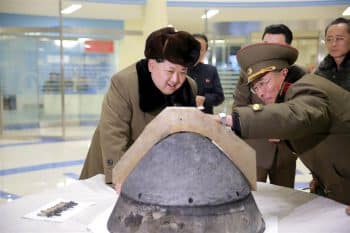Korea: A Settlement? Very Possible, Highly Unlikely, But—
[dropcap]N[/dropcap]orth Korea will never give up its nuclear weapons and its right to maintain them, indefinitely. After all, if the three states that have not signed the Nucelar Non-Proliferation Treaty , India, Pakistan, and Israel, can have them, why not North Korea? The excuses for India and Pakistan are primarily each other, for Israel, its size and its geographical isolation. For North Korea, the reason is a rather different one. Rather, it is several reasons. Let me count (some of) them: North Korea (1950-53), Iran (1953), Guatemala (1954), Vietnam (1954), Hungary (attempted, 1956), Brazil (1964), the Dominican Republic (1965), Chile (1973), Afghanistan, (1978-86), Nicaragua (partial, 1980s), the Soviet Union (which, despite having nuclear weapons, succumbed to the 75 Years War Against the Soviet Union, 1917-1992), Iraq (2003), Cuba (since 1961, unsuccessful, but still trying), (Iran, presently, still trying), Libya (2012), Venezuela (2017: http://www.globalresearch.ca/large-scale-manoeuvres-encircling-venezuela/5607619 ). And so on and so forth.
..
This is a partial list of countries in which the U.S. has attempted, often but not always with success, what is politely called "regime change." The interventions have ranged from the frank overthrow of a freely elected government (Iran, 1953), to direct military invasion of a supposedly "threatening" military dictatorship which, however, presented no threat to the United States other than what was put out in the government propaganda of the time (Iraq, 2003).
It is very important to note that there has never been a peace treaty, either between North and South Korea nor between the North and the United States following the conclusion of the armistice that ended the fighting in 1953. The North has been asking for such a treaty for many years, as have many elements in South Korea. Under neither Democratic nor Republican Presidents has the U.S. ever shown any inclination to negotiate one. And so, as far as the North Koreans are concerned, the number one objective for the U.S. has been the overthrow of their government, with the likely "unification" (and man, would that be a bloody affair) under South Korean rule. That of course would put a close diplomatic, commercial and military ally of the U.S. on both the Chinese and Russian borders.
As I said at the beginning of this column, the North Koreans are never going to give up their nuclear weapons. Those weapons are the only guarantee they have against U.S.-sponsored "regime change" and the complete loss of their hard-earned sovereignty. (For obvious reasons, as is well known, neither the Chinese not the Russians want that to happen either.) Nevertheless, the outlines of a deal are on the table. 1. A peace treaty is negotiated. (In early 2016, North Korea did say that in return for a peace treaty, it would end nuclear testing. And that had to have been an opening negotiating position.) 2. Relations between North Korea and South Korea and the United States are normalized. 3. All sanctions are lifted. 4. North Korea re-joins the Nuclear Non-Proliferation Treaty, agrees to a freeze on its ballistic missile development program, and subjects itself to regular International Atomic Energy Agency inspections (like Iran), including [perhaps] its military facilities (unlike Iran).
Important references:
1. Bruce Cumings, "A Murderous History of Korea," London Review of Books, May 18, 2017,https://www.lrb.co.uk/v39/n10/bruce-cumings/a-murderous-history-of-korea?utm .
2. Tim Shorrock, "Diplomacy With North Korea Has Worked Before, and Can Work Again,"The Nation, Sept. 5, 2017, https://www.thenation.com/article/diplomacy-with-north-korea-has-worked-before-and-can-work-again/
3. Darrell Prince, "North Korea situation Sept 3 2017: You catch more flies with honey, than vinegar,"http://thecallforunity.org/north-korea-situtation-sept-3-2017/.
Senior Editor, Politics, Steven Jonas, MD, MPH is a Professor Emeritus of Preventive Medicine at StonyBrookMedicine (NY) and author/co-author/editor/co-editor of over 35 books. In addition to his position on The Greanville Post, he is: a Contributor for American Politics to The Planetary Movement; a “Trusted Author” for Op-Ed News.com; a contributor to the “Writing for Godot” section of Reader Supported News; and a contributor to From The G-Man. Furthermore, he is an occasional contributor to BuzzFlash Commentary Headlines and The Harder Stuff. Dr. Jonas’ latest book is Ending the ‘Drug War’; Solving the Drug Problem: The Public Health Approach, Brewster, NY: Punto Press Publishing, (Brewster, NY, 2016, available on Kindle from Amazon, and also in hardcover from Amazon.
His most recent book on US politics is The 15% Solution: How the Republican Religious Right Took Control of the U.S., 1981-2022: A Futuristic Novel (Trepper & Katz Impact Books, Punto Press Publishing, 2013, Brewster, NY), and available on Amazon.
STEVEN JONAS—There are give-ups on both sides here [despite the fact that Korea holds the high ground morally speaking and did not create this insufferable situation, product of US attempts at regional and global domination), but such a resolution would be very beneficial to the North as well as to Russia and China.
[premium_newsticker id=”154171″]
THE BULLET—“Whoever expects a ‘pure’ social revolution will never live to see it. Such a person pays lip-service to revolution without understanding what revolution is,” wrote Lenin in 1916 about the Easter Rising. Today, we are not facing a revolution, but his words nevertheless apply to the Catalan reality. Faced with the imperfections of the Catalan independence movement, the Left has two options: opt for a passive policy that will involuntarily exacerbate the movement’s deficiencies, or follow an active policy that intervenes in reality and pushes the process in a more progressive direction.

This work is licensed under a Creative Commons Attribution-NonCommercial 4.0 International License.
WANTED: MEDIA FELONS
All abject servants of the plutocracy
Parting shot—a word from the editors
The Best Definition of Donald Trump We Have Found
 In his zeal to prove to his antagonists in the War Party that he is as bloodthirsty as their champion, Hillary Clinton, and more manly than Barack Obama, Trump seems to have gone “play-crazy” -- acting like an unpredictable maniac in order to terrorize the Russians into forcing some kind of dramatic concessions from their Syrian allies, or risk Armageddon.However, the “play-crazy” gambit can only work when the leader is, in real life, a disciplined and intelligent actor, who knows precisely what actual boundaries must not be crossed. That ain’t Donald Trump -- a pitifully shallow and ill-disciplined man, emotionally handicapped by obscene privilege and cognitively crippled by white American chauvinism. By pushing Trump into a corner and demanding that he display his most bellicose self, or be ceaselessly mocked as a “puppet” and minion of Russia, a lesser power, the War Party and its media and clandestine services have created a perfect storm of mayhem that may consume us all.— Glen Ford, Editor in Chief, Black Agenda Report
In his zeal to prove to his antagonists in the War Party that he is as bloodthirsty as their champion, Hillary Clinton, and more manly than Barack Obama, Trump seems to have gone “play-crazy” -- acting like an unpredictable maniac in order to terrorize the Russians into forcing some kind of dramatic concessions from their Syrian allies, or risk Armageddon.However, the “play-crazy” gambit can only work when the leader is, in real life, a disciplined and intelligent actor, who knows precisely what actual boundaries must not be crossed. That ain’t Donald Trump -- a pitifully shallow and ill-disciplined man, emotionally handicapped by obscene privilege and cognitively crippled by white American chauvinism. By pushing Trump into a corner and demanding that he display his most bellicose self, or be ceaselessly mocked as a “puppet” and minion of Russia, a lesser power, the War Party and its media and clandestine services have created a perfect storm of mayhem that may consume us all.— Glen Ford, Editor in Chief, Black Agenda Report
window.newShareCountsAuto="smart";






